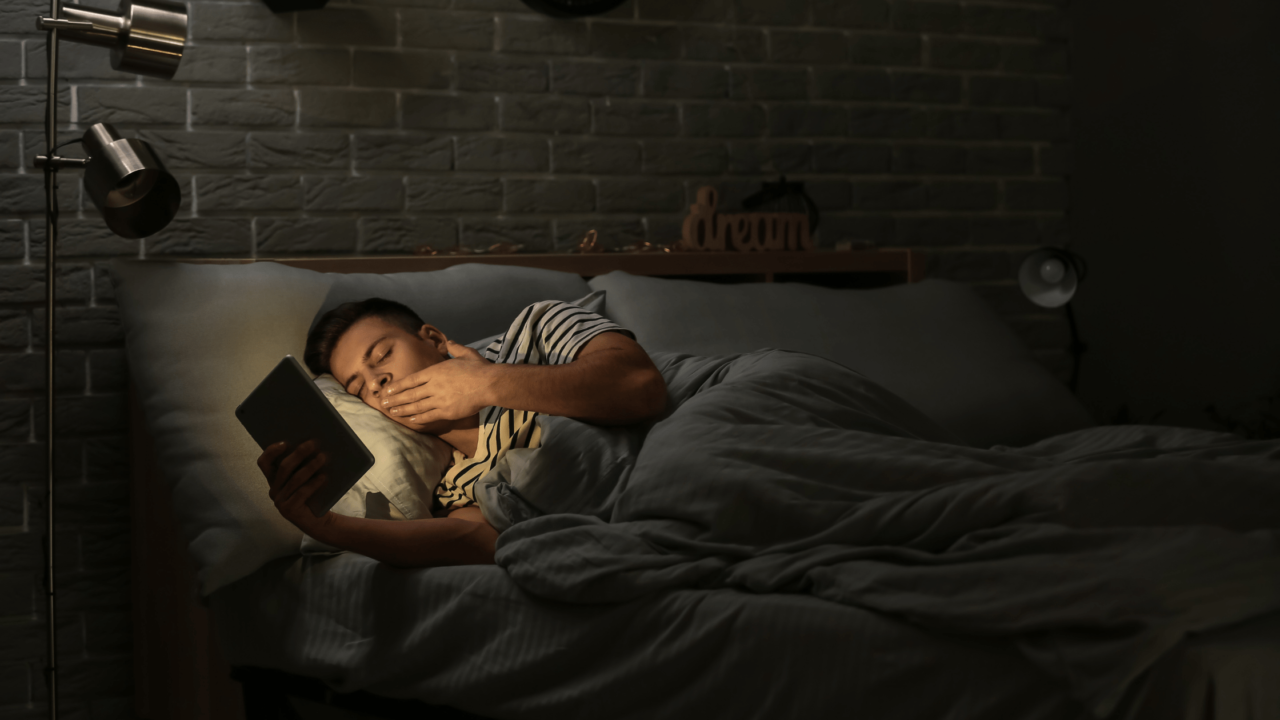Sleep is essential for our health and well-being, but many people struggle to get enough quality sleep every night. Sleep disorders are conditions that affect the ability to sleep well regularly, and they can have serious consequences for physical and mental health. In this article, we will explore what sleep disorders are, what are the most common types, and how telehealth can help diagnose and manage them. We will also discuss the benefits of using telehealth for sleep disorder consultations, and how you can get prescriptions and referrals through telehealth.
What are sleep disorders?
Sleep disorders are a group of conditions that affect the quality, quantity, or timing of sleep. They can cause problems with falling asleep, staying asleep, sleeping too much, or having abnormal behaviours during sleep. Some of the factors that can contribute to sleep disorders include stress, anxiety, depression, medical conditions, medications, lifestyle habits, and environmental factors. Sleep disorders can affect anyone, regardless of age, gender, or background, but some people may be more prone to them than others.
Sleep disorders can harm various aspects of health and quality of life, such as:
• Increased risk of chronic diseases, such as diabetes, heart disease, stroke, high blood pressure, and some cancers.
• Impaired immune system and increased susceptibility to infections.
• Reduced cognitive function, memory, concentration, and learning.
• Mood changes, irritability, anxiety, and depression.
• Decreased performance, productivity, and safety at work, school, or driving.
• Relationship problems, social isolation, and low self-esteem.
It’s important to recognise the signs and symptoms of sleep disorders and seek professional help if they interfere with your daily functioning or well-being. Learn more about how we can help with sleep disorders at Phenix Health here.
What are the most common types of sleep disorders?

There are many different types of sleep disorders, but some of the most common ones include:
• Insomnia: Insomnia is the inability to fall asleep or stay asleep, or having poor quality sleep that does not make you feel refreshed. Insomnia can be acute (short-term) or chronic (long-term), and it can have various causes, such as stress, anxiety, depression, pain, medical conditions, medications, or poor sleep habits. Insomnia can cause daytime fatigue, mood disturbances, difficulty concentrating, and impaired performance.
• Sleep apnea: Sleep apnea is a condition that causes pauses in breathing or shallow breathing during sleep. These pauses can last from a few seconds to minutes and can occur several times an hour. Sleep apnea can cause loud snoring, gasping, or choking sounds, and can disrupt the normal sleep cycle. Sleep apnea can also reduce the oxygen levels in the blood, and increase the risk of cardiovascular problems, such as high blood pressure, heart attack, and stroke. Sleep apnea can be classified into three types: obstructive sleep apnea, where the airway is blocked by the soft tissues of the throat; central sleep apnea, where the brain does not send the right signals to the muscles that control breathing; and complex sleep apnea, where both obstructive and central sleep apnea occur.
• Narcolepsy: Narcolepsy is a neurological disorder that affects the regulation of the sleep-wake cycle. People with narcolepsy experience excessive daytime sleepiness, and may have sudden attacks of sleep that can occur at any time, even during activities that require alertness. Narcolepsy can also cause other symptoms, such as cataplexy, which is a sudden loss of muscle tone and strength triggered by strong emotions; hypnagogic hallucinations, which are vivid and often frightening dreams that occur while falling asleep or waking up; and sleep paralysis, which is a temporary inability to move or speak while falling asleep or waking up.
• Restless legs syndrome (RLS): RLS is a condition that causes an uncomfortable sensation in the legs, usually in the evening or at night, and a strong urge to move them to relieve the discomfort. The sensations can range from tingling, crawling, itching, burning, or aching, and can affect one or both legs or other parts of the body. RLS can make it hard to fall asleep or stay asleep and can cause daytime tiredness, irritability, and difficulty concentrating. RLS can be caused by various factors, such as iron deficiency, kidney disease, pregnancy, or certain medications, but in many cases, the cause is unknown.
• Parasomnias: Parasomnias are abnormal behaviours or events that occur during sleep, such as sleepwalking, sleep talking, nightmares, night terrors, sleep eating, sleep sex, or sleep violence. Parasomnias can be triggered by stress, anxiety, trauma, medications, alcohol, or other sleep disorders. Parasomnias can cause distress, embarrassment, or injury to oneself or others, and can affect the quality and quantity of sleep.
How can telehealth facilitate the diagnosis and management of sleep disorders?
Telehealth is the use of digital technology to provide health care services remotely, such as online consultations, prescriptions, referrals, and monitoring. Telehealth can be a convenient and effective way to diagnose and manage sleep disorders. Some of the advantages of telehealth for sleep disorder patients include:
• Accessibility: You can access telehealth services from anywhere, as long as you have a device with an internet connection. This can save you time, money, and the hassle of travelling to a clinic or hospital. This can be especially beneficial if you live in a rural or remote area, have a disability, or have other commitments that make it hard to attend in-person appointments.
• Convenience: You can schedule telehealth appointments at a time that suits you, and choose the mode of communication that you prefer, such as phone, video, or chat. You can also get your prescriptions, referrals, and test results delivered electronically.
• Continuity and Referrals: You can get consistent and regular follow-up and feedback from your telehealth provider, who can track your progress, adjust your treatment plan, and motivate you to stay on track. You can also get access to online resources, such as educational materials, sleep tips, and support groups, that can enhance your learning and engagement.
• Privacy: You can get telehealth services in a private and comfortable setting, such as your home or office, without worrying about other people’s opinions or judgments. You can also get telehealth services from a provider who is not in your local area if you prefer to keep your sleep disorder confidential.
What are the benefits of using telehealth for sleep disorder consultations?
Using telehealth for sleep disorder consultations can have many benefits for your health and well-being, such as:
• Improving your sleep quality and quantity, which can have positive effects on your physical and mental health, such as lowering your risk of chronic diseases, boosting your immune system, enhancing your cognitive function, mood, and energy, and increasing your performance, productivity, and safety.
• Reducing your symptoms and complications of sleep disorders, such as snoring, breathing problems, daytime sleepiness, mood disturbances, and impaired concentration, which can improve your quality of life and relationships.
• Increasing your satisfaction and adherence to your treatment plan, which can improve your outcomes and prevent relapse or recurrence of your sleep disorder.
• Empowering you to take charge of your health, by giving you the tools, skills, and support to manage your sleep disorder effectively and independently.
Can you get prescriptions for sleep disorders through telehealth?

Yes, you can get prescriptions for sleep disorders through telehealth, depending on your condition, symptoms, the provider, and your location. Some of the medications that may be prescribed for sleep disorders through telehealth include:
• Benzodiazepines, such as temazepam, lorazepam, or triazolam, are sedatives that can help you fall asleep and stay asleep. But they can also cause dependence, tolerance, withdrawal, and side effects, such as drowsiness, confusion, memory problems, and falls. Not everyone is eligible for benzodiazepines, and many providers may require an in-person visit to prescribe them.
• Non-benzodiazepines, such as zolpidem, zopiclone, or eszopiclone, which are also sedatives that can help you fall asleep and stay asleep, but can also cause dependence, tolerance, withdrawal, and side effects, such as drowsiness, headache, dizziness, and abnormal behaviours, such as sleepwalking, sleep eating, or sleep driving. These medications are not suitable for everyone and are only prescribed at the discretion of your provider.
• Melatonin receptor agonists, such as ramelteon or tasimelteon, which are hormones that mimic the natural melatonin that regulates your sleep-wake cycle, and can help you fall asleep faster, but can also cause side effects, such as drowsiness, headache, nausea, and dizziness.
• Orexin receptor antagonists, such as suvorexant, which are drugs that block the activity of orexin, a chemical that keeps you awake, and can help you fall asleep and stay asleep, but can also cause side effects, such as drowsiness, headache, dry mouth, and abnormal dreams.
• Antidepressants, such as trazodone, mirtazapine, or doxepin, which are drugs that affect the levels of certain chemicals in your brain, and can help you fall asleep and stay asleep, but can also cause side effects, such as drowsiness, weight gain, dry mouth, and sexual problems.
• Antihistamines, such as diphenhydramine or doxylamine, which are drugs that block the action of histamine, a chemical that causes allergy symptoms, and can help you fall asleep, but can also cause side effects, such as drowsiness, dry mouth, and blurred vision.
These are some of the medications that can be prescribed for sleep disorders through telehealth, but there may be others as well. There are also over-the-counter supplements that our providers can recommend, which may have fewer side effects. You should always consult your telehealth provider before taking any medication, as they can assess your condition, recommend the best option, and monitor your response and side effects. You should also follow the instructions and precautions for your medication, and do not stop or change your dose without your provider’s advice.
How to get referrals to sleep specialists through telehealth?
Sometimes, you may need to see a sleep specialist, who is a doctor who has special training and expertise in diagnosing and treating sleep disorders. A sleep specialist can perform a comprehensive evaluation of your sleep history, physical examination, and sleep tests, such as polysomnography (PSG) or multiple sleep latency test (MSLT), which can measure your brain activity, breathing, heart rate, and movements during sleep. A sleep specialist can also provide you with specialised treatments, such as continuous positive airway pressure (CPAP) therapy, oral appliances, surgery, or behavioural therapy, depending on your condition and needs.
You can get referrals to sleep specialists through telehealth, by booking an online consultation with a doctor or a nurse, who can assess your symptoms, review your medical history, and determine if you need to see a sleep specialist. They can also refer you to a sleep clinic or a sleep centre, where you can undergo sleep tests and treatments. You can also get your referrals delivered electronically, without visiting a clinic or a hospital.
How can Phenix Health help you with your sleep disorder?
Phenix Health is a telehealth provider that delivers online health services 24/7, provided by Australian doctors and healthcare professionals. Phenix Health can help you with your sleep disorder by offering you the following services:
• Online consultations: You can book an online appointment with a doctor or a nurse, who can diagnose your sleep disorder, prescribe medication, refer you to a sleep specialist, and provide you with online sleep disorder help. You can choose to have your consultation via phone, video, or chat, at a time that suits you.
• Online prescriptions: You can get your prescriptions for sleep disorder medication delivered electronically. You can also order your medication online and get it delivered to your door, or pick it up from a nearby pharmacy.
• Online referrals: We can provide referrals to sleep specialists or sleep clinics, who you can then easily book an appointment with. Our healthcare professionals may also refer you for pathology testing, that way, they can see your blood test results and determine if there is anything in your blood profile that may be related to your sleep issues.
• Online coaching: You can get online coaching from a nurse, who can provide you with support, education, and care coordination for your sleep disorder. You can get tips and advice on sleep hygiene, lifestyle changes, and coping strategies, and get feedback and encouragement on your progress. You can also get access to online resources, such as sleep tips, sleep apps, and support groups, that can help you improve your sleep quality and quantity.
Conclusion
Phenix Health’s telehealth services play a crucial role in the diagnosis, treatment, and management of sleep disorders in Australia. The convenience, accessibility, and benefits of online consultations make it easier for individuals to prioritise their sleep health. By offering bulk-billed appointments and e-scripts for sleep, Phenix Health ensures that quality healthcare is accessible to all, 24/7. It’s also an affordable solution, with consultations starting from just $19!






Phenix Health delivers online health services 24/7 provided by Australian doctors and healthcare professionals.